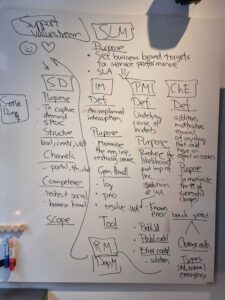Smart service is a competitive advantage
Service teams drives the world’s service-based economy. The companies that provide the smartest service have a big competitive advantage. ITILv4 can be a building block in the foundation that contributes to faster and smarter services.
What is ITIL 4?
ITIL 4 provides a flexible foundation for organizations that need to integrate different frameworks and approaches into their service management business models.
ITIL 4 is an update of the ITIL framework, ITIL 4 introduces a holistic approach to service management focusing on “end-to-end service management from demand to delivered value”. ITIL 4 also reflects the latest trends in software development and IT operations and includes advice on how to apply practices such as Agile, DevOps and Lean in the service management domain.
Atlassian’s 3 tips on teams’ journey from cost centers to value centers
ITIL 4 is supported by Jira Service Management, we are happy to share three useful tips taken from Atlassian’s blog that can facilitate your team’s journey from cost center to value center. Fully in line with ITIL 4.
1. Focus on Outcome, not Output
Teams that focus on doing everything right according to rigid processes and contracts often get stuck in the endless stream of problems, defects, and incidents. Instead, prioritize the work that is in line with the long-term business goals. Look for ways to streamline work by minimizing and automating tasks and maximizing value. The goal is to move from “doing things right” to “doing the right things”.
Tip #1: Think Lean and value stream. By visualizing the end-to-end process, your team can identify unnecessary steps (waste), bottlenecks and find improvements.
Map the value stream of any service, product, or process. For example, the service desk is a good place to start. Consider every step taken between the demand and the outcome. It helps you identify bottlenecks and discover where automation can improve your flow.
Change control with heavy processes can be time consuming, weave in more collaboration and speed up change management. Automate low risk change management and simplify approval processes.
2. Culture + practice > Tools + processes
Many teams think that they are using the “right” tools and following the “right” processes, yet they still fail to achieve their desired results. Time and money are spent on complex tools without achieving the desired effect, instead resulting in higher costs and reduced speed.
One reason could be that they did not focus on culture and work methods (ITIL Practice). Shared values and attitudes allow you to build a resilient organization that can quickly adapt to change. ITIL 4 includes “Guiding Principles”, such as “Focus on value”, “Collaborate and promote visibility” and “Think and work holistically” as a starting point for building a healthy organizational culture.
Instead of insisting on strict processes, successful teams adopt adaptable practices and behaviours, based on collaboration and transparency.
Tip #2: How to improve teamwork and culture? Do you know the Atlassian Team Playbook? Start with “Health monitor”, find the current state of your teams health, track progress and build trust among team members.
For incident management, strong, team-centric incident management practices change how you respond to and recover from major incidents. Run one of the Atlassian Incident Response plays that cover everything from establishing a game plan, to how to communicate, to continuous improvement with Post Incident Reviews (PIR).
3. Embrace Agile and DevOps
It’s no longer ITSM versus Agile, or ITSM versus DevOps. ITIL 4 encourages an integrated approach that combines best practices for all ways of working, such as Agile, DevOps and Lean. These practices keep the rules simple, so teams can adapt based on the situation, focus on good results for the customer, and learn from mistakes.
Tip #3: Continuous improvement is a key component of ITIL 4. Instead of a single “big bang” release, teams work iteratively by breaking work into smaller, two- to four-week cycles.
Agile retrospective meetings help teams reflect on and discuss what worked well (and what didn’t work well), in order to continuously improve.
Atlassian has incorporated agile methodologies and DevOps practices into its IT processes for many years, and we are excited to see this way of working become the industry standard. The market demands that you be able to quickly deliver new functionality, recover from interruptions, plan and manage available resources. Organizations today face an unprecedented rate of change. Now is the time for high-velocity teams to embrace the shift from rigid rules to flexible guidelines to drive business forward.
ITIL 4 certified Atlassian consultants
At Stretch Addera we see increased demand within service management. Smart and flexible service is required in a service-based economy. In alignment with our focus in ITSM, we have grown our team of ITIL 4 certified specialists. Twelve colleagues from five hubs were drilled in ITIL 4 during two lovely February days at the Stockholm hub.
Our inspiring course leader from Olingo guided us towards certification and new skills. Thank you, Fredrik, for two value-creating days that will bring more value to our customer assignments. Just think about all the value we will create, together with our customers, through the 4 dimensions Organizations and people, Information and technology, Partners and suppliers and Value streams and processes.

Atlassian Jira Service Management
Whether you’re a startup trying to manage incoming requests, a growing team standardizing your service management practices, or a global enterprise looking for a faster, more flexible ITSM solution, there’s a Jira Service Management plan for you. Stretch can guide you to the right cloud plan, simplify your implementation project, get you started with service catalog and CMDB and also ensure a management team for the solution. Contact us and we’ll tell you more!

